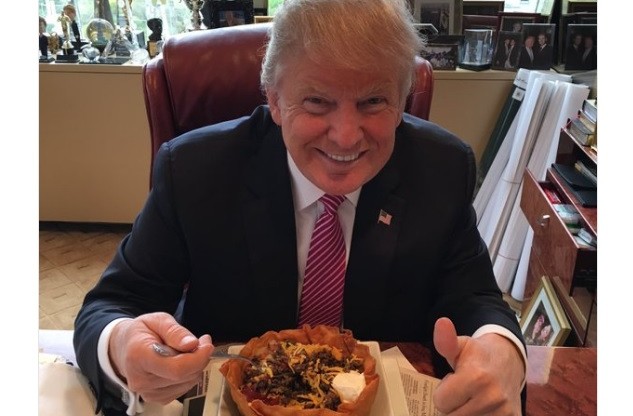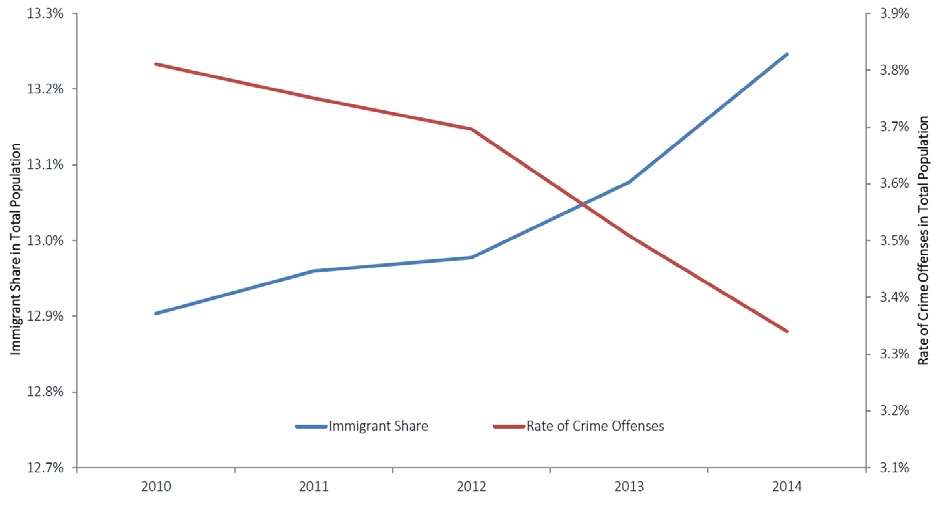'Immigrants Are Responsible for Substantial Economic Growth'
New MassTLC study richly documents how newcomers grow the economy, cause less crime than natives, and do high-tech jobs that Americans won't do.

President Donald Trump may be resolutely anti-immigrant, but he is also studiously wrong about the positive impact that immigrants have on the U.S. economy. Far from taking "our" jobs, causing crime, and slurping up government handouts, immigrants are more likely than natives to create billion-dollar companies, work in the high-tech industry, and help create a bigger, better American future.
That's the inescapable conclusion of "The Economic Impact of Immigration in the U.S., a massive (and massively documented) study from the Mass Technology Leadership Council (MassTLC), a trade nonprofit, that grew out of the group's efforts to blunt Trump's immigration bans.
As of January 1, 2016, "[i]mmigrants have started more than half (44 of 87) of America's startup companies valued at $1 billion dollars or more and are key members of management or product development teams in over 70 percent (62 of 87) of these companies." More than half of Silicon Valley's corporate founders are immigrants.
The integral role that immigrants play in the technology industry is one of job creation, innovation, and leadership. Far from taking jobs, immigrants are creating jobs for the native-born population and helping meet the needs of an industry constrained by a lack of skilled workers. By 2020, for example, projections indicate that 1.4 million computer specialist positions will be open in the United States, but domestic universities will only produce enough graduates to fill 29 percent of those jobs. In Massachusetts today, there are seventeen technology jobs for every person who graduates with a college degree in computer science or information technology.
Immigrants are responsible for substantial economic growth. This is true of the U.S. economy where, in 2015, immigrants contributed $2 trillion to the U.S. GDP, representing 11 percent of the country's total GDP. It is also true of the Massachusetts economy, where one study found that if half of Massachusetts' 3,608 advanced level graduates in science, technology, engineering, and mathematics (STEM) related fields, studying on temporary visas, remained in Massachusetts upon graduation, then 4,726 new jobs would be created for U.S.-born workers by 2021.
Research indicates that immigrant students are disproportionately more likely to get their degrees in a STEM field – an area of critical domestic talent shortages – and that international students make up over 30 percent of the post-baccalaureate degrees in STEM fields. Furthermore, individuals from Iran, Libya, Somalia, Sudan, Syria, and Yemen – the six countries subject to the President's revised Executive Order – are more likely to have a bachelor's degree, approximately twice as likely to have a graduate degree, and four times as likely to have a doctoral degree relative to the native-born population.
In addition to this population being disproportionately educated and skilled, they are also part of a population making immediate impacts on the U.S economy. During the 2015-16 academic year alone, international students contributed $32.8 billion to the U.S. economy and supported more than 400,000 jobs.
The study notes that according to national surveys by Pew, Gallup, and others, majorities of Americans believe that immigrants (particularly illegal immigrants) increase crime rates. The actual correlation runs in the other direction: As the immigrant share of the population has risen, crime has gone down:

While immigrants are more likely to be the victim of a hate crime, they are no more likely than native-born Americans to be radicalized, according to the database Profiles of Individual Radicalization in the United States (PIRUS).
It's notoriously difficult to have a fact-based, rational argument over immigration policy, especially when elected officials such as Rep. Steve King (R-Iowa) and the president are attacking the basic humanity of immigrants. Indeed, when dreaming of an electrified fence between Mexico and the United States, King once noted, we "do this with livestock all the time." But if you are interested in grounding your position in reviews of the literature about how immigrants affect economic growth, unemployment, and crime (including terrorism), check out the MassTLC report for a treasure trove of information.


Show Comments (74)